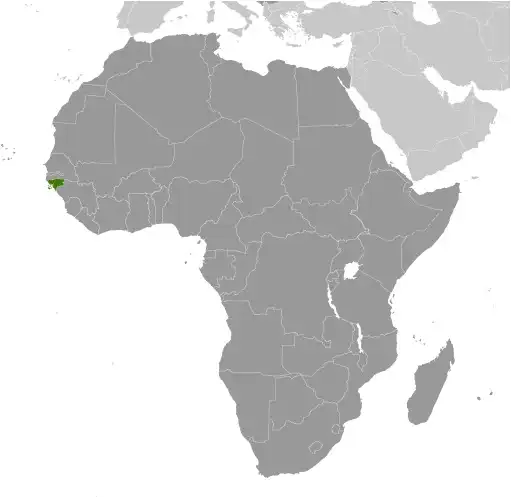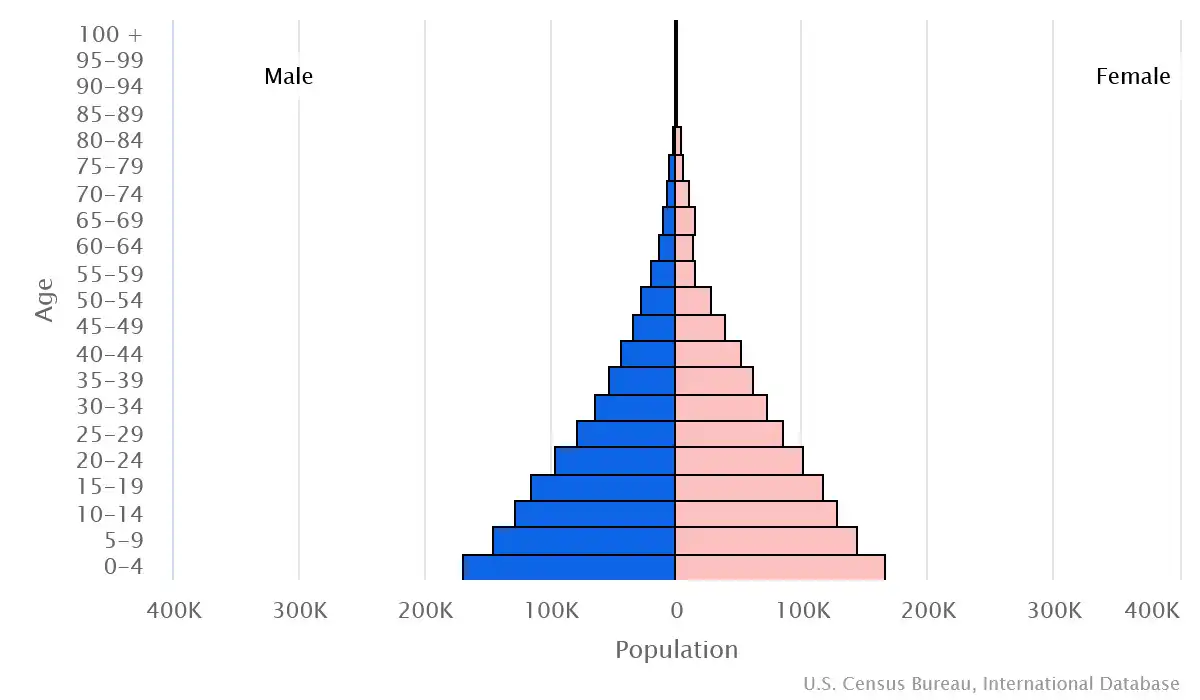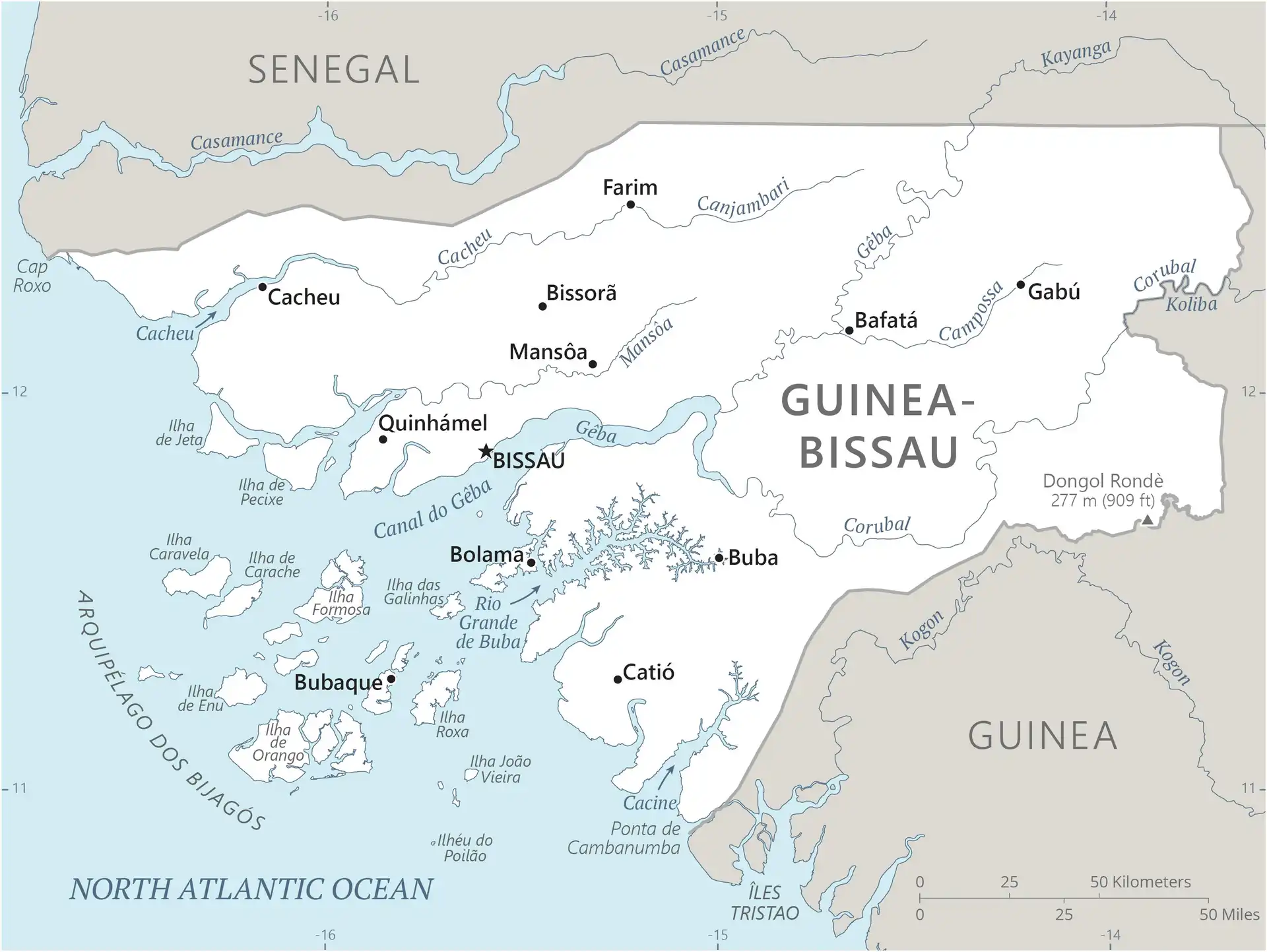
Guinea-Bissau Country Profile
Key Facts of Guinea-Bissau

| Government type: | semi-presidential republic |
| Capital: | Bissau |
| Languages: | Portuguese-based Creole, Portuguese (official; largely used as a second or third language), Pular (a Fula language), Mandingo |
Guinea-Bissau Demographic Data
Ethnic Groups in Guinea-Bissau(2015 est.)
Religious Groups in Guinea-Bissau (2020 est.)
Age pyramid of Guinea-Bissau

Guinea-Bissau Economy Statistics
Economic overview of Guinea-Bissau
extremely poor West African economy; ethnically diverse labor force; increasing government expenditures; slight inflation due to food supply disruptions; major cashew exporter; systemic banking instabilities and corruption; vulnerable to oil price shocks
Guinea-Bissau Real GDP (purchasing power parity) in Billion $
Guinea-Bissau Real GDP per capita in $
Guinea-Bissau's Exports & Imports in million $
Top 5 Import Partnerin 2022 (79%) of Guinea-Bissau
Top 5 Import Commodities in 2022 of Guinea-Bissau
- refined petroleum ⛽
- steel 🛠️
- rice 🍚
- flavored water 💧
- beer 🍺
Top 5 Export Partnerin 2022 (98%) of Guinea-Bissau
Top 5 Export Commodities in 2022 of Guinea-Bissau
- coconuts/Brazil nuts/cashews 🌰
- fish 🐟
- fish oil 🛢️
- palm oil 🛢️
- dried fruits 🍇
Geography of Guinea-Bissau
Map of Guinea-Bissau

Land and Water Distrubtion of Guinea-Bissau
Natural Resources of Guinea-Bissau
- fish 🐟
- timber 🌲
- phosphates ⛏️
- bauxite 🪨
- clay 🧱
- granite 🪨
- limestone 🪨
- unexploited deposits of petroleum 🛢️
Climate inGuinea-Bissau
tropical; generally hot and humid; monsoonal-type rainy season (June to November) with southwesterly winds; dry season (December to May) with northeasterly harmattan winds
History of Guinea-Bissau - a Summary
For much of its history, Guinea-Bissau was under the control of the Mali Empire and the Kaabu Kingdom. In the 16th century, Portugal began establishing trading posts along Guinea-Bissau’s shoreline. Initially, the Portuguese were restricted to the coastline and islands. However, the slave and gold trades were lucrative to local African leaders, and the Portuguese were slowly able to expand their power and influence inland. Starting in the 18th century, the Mali Empire and Kingdom of Kaabu slowly disintegrated into smaller local entities. By the 19th century, Portugal had fully incorporated Guinea-Bissau into its empire.
Since gaining independence in 1974, Guinea-Bissau has experienced considerable political and military upheaval. In 1980, a military coup established General Joao Bernardo 'Nino' VIEIRA as president. VIEIRA's regime suppressed political opposition and purged political rivals. Several coup attempts through the 1980s and early 1990s failed to unseat him, but a military mutiny and civil war in 1999 led to VIEIRA's ouster. In 2000, a transitional government turned over power to opposition leader Kumba YALA. In 2003, a bloodless military coup overthrew YALA and installed businessman Henrique ROSA as interim president. In 2005, VIEIRA was reelected, pledging to pursue economic development and national reconciliation; he was assassinated in 2009. Malam Bacai SANHA was then elected president, but he passed away in 2012 from a long-term illness. A military coup blocked the second round of the election to replace him, but after mediation from the Economic Community of Western African States, a civilian transitional government assumed power. In 2014, Jose Mario VAZ was elected president in a free and fair election, and in 2019, he became the first president in Guinea-Bissau’s history to complete a full term. Umaro Sissoco EMBALO was elected president in 2019, but he did not take office until 2020 because of a prolonged challenge to the election results.
